Nonviolence
So much is at stake here at the dawn of the year 2017. The fate of the planet is in the balance as never before, as is the very integrity of our faith. We cannot waste our time hoping on a faraway unimaginable heaven where there is no war and baby Jesus sleeps safely in his manger.
What we desperately need is the disarmament that Christians and other seekers of peace throughout the world — from Dorothy Day to Dr. Martin Luther King, Jr. — have prayed and struggled for.
In a time of anti-immigrant fervor, religious distrust, and high political polarization, the peace-building Mennonites in Harrisonburg provide one robust model of how to transcend nationalism and bridge divides. Though relatively modest in size, they are showing how even a small group can affect major, positive change, shaping the hearts and minds of the local ecosystem.
If I’m completely honest, I’ve been really discouraged as of late. A major source of my discouragement has been the way the American evangelical church (a tribe I have identified with for most of my life, so my critique and exhortation will be directed there) has chosen to engage the world in this season marked by division, violence, and trauma. Now, I admit I’m speaking in generalities, but rather than being the healing balm to society’s gaping wounds, we have often contributed to the bleeding by either withdrawing in fear or adding fuel to the violence.
WHAT LIVES THESE two authors have lived and what lessons they can teach us! Reading David Hartsough’s lively memoir immerses us in the great peace and justice events of the last several decades. Colman McCarthy’s fascinating interchanges with high school and university students propel us into a hopeful future as we see how young minds are stretched and carry lessons learned into the world.
Hartsough’s FBI file started when he organized his first anti-nuclear protest at age 15, and it may be growing still as he directs Peaceworkers, a nonviolent training and accompaniment NGO based in San Francisco. In between are 60 years of peace work in the U.S. and the flashpoints of the world, always bringing the message of the necessity and efficacy of nonviolent direct action. In Waging Peace he relives the adventurous life of a professional peaceworker as well as the silent efficacy of his family’s tax resistance and tradition of simple living.
Whether disarming with words a knife-wielding segregationist opponent at a Virginia lunch counter, blockading with a canoe a weapons ship bound for Vietnam, or traveling to war zones, Hartsough has faithfully carried forward his commitment to nonviolence. Sometimes visiting conflict sites before they reach the radar even of other peace people, he writes of going to Cuba, Russia, Yugoslavia, and the Berlin Wall while still a college student, to Central America during the ’80s, and later to Gaza and other war zones.
In 1999, after trying unsuccessfully to persuade the world to support nonviolently the beleaguered Kosovars and thus avert a Serbian bloodbath, Hartsough attended a peace conference in The Hague. There he met Mel Duncan, and together they founded the Nonviolent Peaceforce, now the largest of several worldwide movements of accompaniment for nonviolent activists.
In California, Hartsough worked to launch the huge Abalone Alliance against the Diablo Canyon nuclear power plant and campaigned against the development of nuclear weapons at the University of California’s Lawrence Livermore National Laboratory. In this century, Hartsough was one of the first to be arrested for protesting drone warfare at Creech Air Force Base.

Image via MIGUEL GARCIA SAAVEDRA/Shutterstock.com
I wish that the testimony of my friends who literally beat guns into garden tools could be part of the courtroom proceeding. They urge us to make guns and other weapons unnecessary, using raw tools of compassion and service to heal the conflicts in which weapons are used. I wish my young Afghan friends here in Kabul, who live under constant surveillance of Unmanned Aerial Systems, could testify about their desire to refine tools of peace making and constructive service.
The name Berrigan helped keep the possibility of coming back to my Christian aith alive. Just like the black churches that took me in, here were some Christians who were saying and doing what I thought the gospel said that nobody in my white evangelical world was. I believe the witness of the Berrigans literally helped keep my hope for faith from dying altogether.
IN DECEMBER 2007, Naomi Mwangi, a Christian, fled her home in Kisumu, Kenya, as men with machetes attacked towns across the region. For five weeks violence raged nationwide. When the bloodshed ended, more than 1,300 Kenyans were dead and another 650,000 had been displaced. Mwangi and her family ended up living in the Maai Mahiu refugee camp, south of Nairobi. She was 12 years old.
Mwangi is coming of age in a society with ethnic violence in the background, extremist violence in the foreground, and massive economic inequality. Africa has the highest concentration of young people in the world and more than half of them are unemployed. Mwangi wanted something different—she wanted to work for peace.
Now 21, Mwangi is a leader in grassroots peacemaking campaigns that seek to end conflicts between the 42 ethnic groups in this majority-Christian country. The 2007 election violence pitted Christian against Christian, as ethnic ties trumped religious affiliation. Even now, during elections, Mwangi told Sojourners, “Leaders motivate youth to join in the political crisis ... to fight against another tribe.”
A major obstacle to social and economic stability among youth in Kenya is unequal distribution of government-issued identification cards. Kenyans need ID cards for everything from voting and university enrollment to obtaining grants for entrepreneurship programs. But historically, the ruling government doled them out as political favors, and they’ve often been denied to members of minority groups.
“There are plenty of applications at election time,” Mwangi said, explaining that the ID process is slowed down or delayed when it seems one ethnic group could tip the chances of a politician who represents a different group.
Dan Berrigan published more than 50 books of poetry, essays, journals, and Scripture commentaries, as well as an award winning play, The Trial of the Catonsville Nine, in his remarkable life, but he was most known for burning draft files with homemade napalm along with his brother Philip and eight others on May 17, 1968, in Catonsville, Md., igniting widespread national protest against the Vietnam War, including increased opposition from religious communities. He was the first U.S. priest ever arrested in protest of war, at the national mobilization against the Vietnam War at the Pentagon in October 1967. He was arrested hundreds of times since then in protests against war and nuclear weapons, spent two years of his life in prison, and was repeatedly nominated for the Nobel Peace Prize.
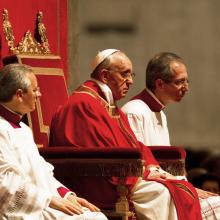
Image via Philip Chidell / Shutterstock.com
For over 1,500 years, the Catholic Church has promoted “just war theory” as a way to determine in what cases a war can be considered morally justifiable. But all of that may change.
In an interview, Cardinal Peter Turkson of Ghana said that it is “plausible” that Pope Francis may write a new encyclical updating Catholic teaching on war and peace, an update that could include a retreat from just war theory. Francis’ last encyclical, “Laudato Si,” made waves for its condemnation of capitalism and call to address climate change.

Dietrich Bonhoeffer, Photo via Wikimedia Commons
The German pastor was executed by the Nazi regime at Flossenbürg concentration camp on April 9, 1945, just two weeks before the United States liberated the camp. When he died he famously remarked to another prisoner, "This is the end — but for me, the beginning."
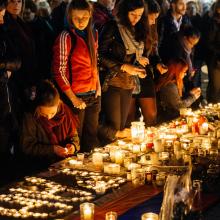
Image via Hadrian/Shutterstock.com
"Instead of preaching, perhaps what is more appropriate is, in fact, confession of how hard it is to actually love our enemies,” says Pastor Jarrod McKenna.
Though this video reflection for Common Grace’s Love Thy Neighbour campaign was filmed a few weeks ago, its pre-scheduled release today goes right to the heart of enemy love and offers a Christian response to terrorism in the days after shocking attacks in Brussels, Istanbul, and elsewhere.
“This teaching is the most often quoted teaching of the early church, because it is the teaching that sums up the cross the easiest,” he says.
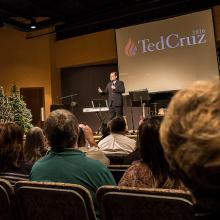
Senator Ted Cruz is a guest during a morning service at Christian Life Assembly of God in Des Moines, Iowa on Nov. 29. Photo by Clay Masters, iprimages/Flickr.com
Ted Cruz ended Monday night with a yuuuuge victory over Donald Trump in Iowa. (Sorry, had to do it!) Religion played a big role in Cruz’s victory. The New York Times reports that Cruz’s victory was “powered by a surge of support from evangelical Christians.”
For his part, Cruz reaffirmed his connection with his evangelical supporters by evoking divine favor upon his victory. “God bless the great state of Iowa! Let me first say, to God be the glory.”
But I can’t help but feel uneasy about the God proclaimed by the so-called "evangelical vote." That’s because, when it comes to their evangelical faith, they have an identity crisis.
If we see our interests and needs as more important than the interests and needs of others, then we’ll never have peace in our personal lives or in our world. Peace requires a recognition that we’re all equally beloved children of the same loving God.
It involves recognizing that we all matter equally — and then doing some introspection to see if we’re living up to it in our various relationships.
As the #BlackLivesMatter movement reminds us, the civil rights struggle is far from over. The blood, sweat, and tears of our 20th-century civil rights heroes must be followed up by the clear-eyed resolve of a new generation. Ideally, celebrations like Martin Luther King Day should help to sustain this resolve, energizing us for the hard work ahead.
That being said, I suspect that King would not be too thrilled about MLK Day.
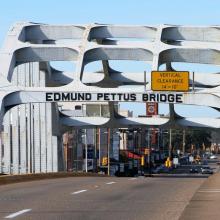
Edmund Pettus Bridge in Selma, Ala. James R. Martin / Shutterstock.com
We live in a culture that not only glorifies violence, but often celebrates its use against the “enemy" as the truest form of heroism and bravery. While I won’t get into the debate of whether violence is ever justified to preserve life (a much bigger conversation extending far beyond an 700-word post), I will say I’m deeply troubled by our assumption that violence is the only way to respond to a real or perceived threat.
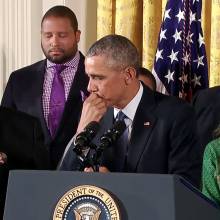
Photo via The White House / YouTube
President Obama's eagerly anticipated announcement about his executive action regarding gun violence was a rare emotional speech for the president. Read the full text of what he said here.
There are different ways to understand the gospel's call to peace — and that's a good thing. In the last century alone, many influential Christian leaders have grappled with violence, justice, and peace, and ended up all over the nonviolence map. Where do you land? Take our quiz and find out!
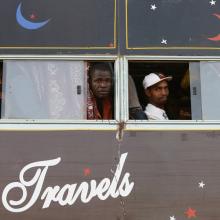
Image via REUTERS / Goran Tomasevic / RNS
Christian leaders have hailed as an act of bravery and selflessness the shielding of some Christians by Muslims after suspected al-Shabab gunmen in Mandera County ambushed a passenger bus.
IN THE LATE 1930s, a large swath of the American church was reluctant for the United States to become involved in another war in Europe. The memory of the Great War was too fresh; what had been intended to be “a war to end all wars,” a crusade for freedom and democracy, in hindsight just looked like senseless horror. Entire denominations committed to peace positions.
This pacifist sentiment troubled Reinhold Niebuhr, who was following the rise of Hitler and spoke out against the atrocities committed against Jews long before they had reached the national consciousness. So in 1940 Niebuhr penned an essay to rally what he saw as a disillusioned, passive church into taking concrete action for social justice. He titled the essay “Why the Christian Church is Not Pacifist” and argued that in a world marred by sin, coercion and violence were sometimes necessary to pursue justice.
After the attack on Pearl Harbor, Niebuhr’s argument against pacifism won the day; U.S. churches lined up en masse to support the war effort. Since then, many Christians have taken it for granted that violence is an unfortunate but realistic necessity if we hope to bring justice in a world where injustice is so pervasive.
Yet a survey of 20th century theology shows that many Christians have grappled with violence, justice, and the gospel and arrived at conclusions quite different from Niebuhr—and from each other. These Christian witnesses for peace include familiar voices such as Dorothy Day, Thomas Merton, Martin Luther King Jr., John Howard Yoder, and Stanley Hauerwas, but also many less well-known voices, such as the ones listed on the following pages. Examined together, these eight perspectives show that Christian nonviolence isn’t a singular position, but rather a rich conversation wrestling with what it means to live out the biblical call to justice amid the complexities of ever-changing political, social, and moral situations.










